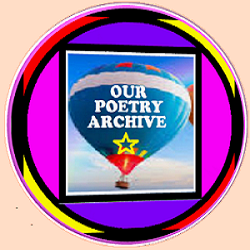From The Editor
During this journey of seven years, our primary
focus was on punctuality, continuity, diversity, and quantity. We have already
covered these areas with excellence. With the upcoming first issue of the
eighth year, April 2022, we will earnestly try to develop the quality of the
web journal. To ensure better quality, we have to be more selective. So, we
have to reject mediocre poems. We know, quite a good number of poets will
welcome this decision. We know others will be disheartened much not to see
their poem in Our Poetry Archive. Mainly those with mediocre literary merit.
We hope they will develop their writing skills and
produce qualitatively better poems. Certainly, we will publish good poems. All
our focus should have to be around quality publications. We seek all-around
cooperation from all the poets.
We can achieve this quality of upliftment only
when our poets extend their support. So, the keywords are cooperation and
continuous efforts to improve literary skills. We want to appeal to all our
poet friends, please try to focus on this particular area. And encourage others
to develop their writing skill.
Many would like to argue who should decide upon the literary merits of the poems written by a poet. Yes, it is a tricky question. Only time as the eternal and the ultimate judge can accurately filter literary creativities on literary merits. Yet, as an editor of any literary journal, one has to bear the responsibility to select quality works and publish them. Now with this editorial job of publishing the best literary works, the role of the editors is too important. The quality of the journal depends heavily on the editors. None can ensure, all the selections would be qualitatively brilliant. It can only help the readers to get selective poems of better literary merit. An editor or an editorial team only can do this. The rest depends on the poets. Even then, there would remain a possibility of the judgment of errors. We are all human. So, we cannot say all the rejected stuff is not good enough for publication anywhere. We can only assure we will try our best to select only the better poems for our upcoming issues.
Yet, the editor or the editorial team can never
set guidelines or rules for the poets. How they should write better poems. We
can only select the best poems according to their literary merits. We can only
ask for quality submissions. We can only hope that most poets will support this
new endeavor taken up by us. I have already confessed. We are not in a position
to impose any guidelines. We are not in a situation to set any rules. We cannot
dictate to any poet or anyone, how to write better poems of higher literary
merits. Still, we can discuss a few common trends and beliefs. That prevents
many of us from writing better poems of higher literary merits.
Most of the poets, those who have started
publishing their poems only after the advent of social media, believe that
writing poetry is a spontaneous expression of personal emotions. I do not
adhere to this view. If, and only if poets can successfully transform these
personal emotions into non-personal universal emotions. Only then do readers
come back again and again to the literary works of the poet. They can connect
their personal experiences with the universal experience of human beings.
Readers will never return to go through the personal emotions of the poet.
Sadly enough, most of us of only the online experience of publishing poetry do
not understand the basic features of literature. Literature cannot be the
spontaneous expression of the personal emotions of the author. I am not saying
that an author should not express personal emotions. The authors' responsibility
is to transform personal emotions into impersonal universal emotions. If, and
only if poets can successfully transform these personal emotions into
non-personal universal emotions. Only then do readers come back again and again
to the literary works of the poet. They can connect their personal experiences
with the universal experience of human beings.
Let me quote from the famous poet T. S. Eliot.
“Poetry is not a turning loose of emotion, but an escape from emotion; it is
not the expression of personality, but an escape from personality. But, of
course, only those who have personality and emotions know what it means to want
to escape from these things”. I can only ask my fellow poets, especially those
who believe in the spontaneous outflow of personal emotions into poetry, to
reconsider their beliefs and view. We at Our Poetry Archive would like to
follow the opinion of the famous poet T.S. Eliot. We wish to select the poems
from the submission keeping this viewpoint in mind.
One more common feature that I would like to point
out, in the form of writing poetry. Many poets, especially those who have
started writing poetry recently and mainly on social media, write short
articles instead of poems. Their writings move around a narration of their moral
views of life. They narrate a story or a viewpoint in prose style or rhythm.
That never becomes poetry. We are sorry to say, we would not publish these
short of junks anymore. I know all these may start controversies all around.
Still, I hope, those who realize the pros and cons of poetry, of the literary
merits of the writing skills would not hesitate to welcome our decision.
With this hope, I would like to request all our
friends and poets only to submit the best of their literary creativities. We
are eager to nourish their creative brilliance through our constant endeavour
to serve quality publications.
NilavroNill Shoovro
From The
Editorial Desk
OPA
A
WORLDWIDE
WRITERS’ WEB
PRESENTATION!
PUBLISHED
BY
OPA
OUR
POETRY ARCHIVE
ONLINE MONTHLY POETRY JOURNAL
https://ourpoetryarchive.blogspot.com
email us to:
**************************************





